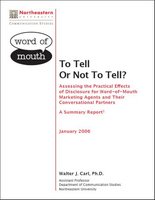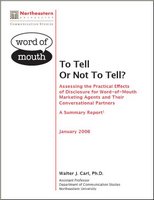Jonah Bloom, the executive editor of Advertising Age, writes a compelling piece that appeared yesterday on AdAge.com (free subscription required; also available here). After praising the Word of Mouth Marketing Association (WOMMA) for making "smart moves" -- 1) engaging bloggers by inviting them to blog about the recent WOMMA Basic Training conference and to participate in the ongoing discussions about the role of word-of-mouth, 2) taking a firm stand on ethics by standing against shill and stealth marketing, and 3) anticipating concerns raised by the FTC -- he also challenges WOMMA to avoid a marketing "silo mentality." He writes:
The once concern with all of this is that with the emergence of such a strong association and what seemed from the conference to be something of a new-members club of executives, we could be yet again witnessing the cultivation of a marketing silo rather than the full integration of a new philosophy and skill set.Bloom's essay is important for at least two reasons. First, it helps us understand that WOM is not just a sexy campaign but rather a larger philosophy of monitoring existing consumer-to-consumer conversations, creating spaces for consumer conversations and listening to them, early and ongoing engagement, relationship-building, shared control with consumers and other stakeholders, creating products and experiences that are worth talking about, etc.. (Of course, the sexy and creative campaigns can be an activity that grows out of the larger philosophy). Second, Bloom's essays recognizes the need to adopt a systems approach to how organizations communicate both internally and externally (that is, a way of seeing how all the parts and processes are interdependent and need to work together in order to be effective). Bloom argues, and I agree, that without integrating WOM principles into the whole of an organization, WOM will be seen simply as a boutique activity.
At the WOMMA conference Bloom facilitated a panel discussion on the challenges and opportunities when companies seek to integrate WOM into their corporate philosophies. Panelists included representatives from Intuit, BzzAgent, and Conference Calls Unlimited.
Disclosure: I am a member of WOMMA's Advisory Board.
-->
Tags: WOM word of mouth Word-of-Mouth Marketing










